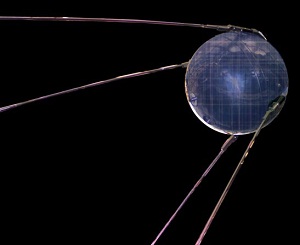President Obama issues renewable energy challenge
 What do clean energy and Sputnik have in common?
What do clean energy and Sputnik have in common?
They’re both challenges that the United Sates can rise to. When the former Soviet Union launched Sputnik and became the first country to put a satellite in orbit, the U.S. was caught somewhat off guard. The U.S. now faces increasing competition from global innovation in renewable, and President Obama, during his State of the Union speech on Jan. 25, likened that competition to the space race that ensued after Sputnik first flew across the night sky.
On Tuesday night, President Obama delivered his second State of the Union address and made U.S. investment in clean energy one of his top priorities—both in terms of job creation and in preparing for the future.
“I'm asking Congress to eliminate the billions in taxpayer dollars we currently give to oil companies,” he said during the speech. “I don't know if—I don't know if you've noticed, but they're doing just fine on their own. So instead of subsidizing yesterday's energy, let's invest in tomorrow's.”
You heard it: a public acknowledgement of how much our country subsidizes the fossil fuel industry and a concurrent commitment to solar and other renewable energy sources.
Still, putting us on the path to 80 percent clean energy by 2035 seems like a Herculean task, given that no state has enacted a renewable portfolio standard in excess of even 40 percent.
On the other hand, there are other ways to meet that lofty goal, said Deputy Editor of Solar Today and spokesperson for The American Solar Energy Society Seth Masia.
“Well, it is possible if you define clean energy to include nuclear power, natural gas and hydroelectric power,” he said. “The President also includes the fictional ‘clean coal.’”
The commitment to clean energy would require substantial change, Masia said.
“To meet Obama's goal, we'd have to convert the equivalent of 1 percent of our national generating capacity annually from coal to a cleaner technology, while converting growth in demand to efficiency measures,” he said. “It means creating roughly 10 gigawatts of non-coal generating capacity annually, and converting 40 million kilowatt-hours of production. Solar can now provide about 1 gigawatt of new capacity annually. We'll see how quickly that share can accelerate.”
Obama stressed the need for investments in clean energy technology to continue to create new jobs.
“Clean energy breakthroughs will only translate into clean energy jobs if businesses know there will be a market for what they're selling,” he said.
Solar Energy Industries Association president Rhone Resch that night observed that the solar industry is becoming a major employer in the U.S.
“Tomorrow morning, nearly 100,000 Americans in all 50 states will go to work as they do every day—at solar manufacturing facilities; on the roofs of homes and business installing the latest solar technology, at offices offering support in finance, legal and marketing departments,” he said. “More are finding work in solar every single day.”
According to the Foundation’s National Solar Jobs Census 2010, the solar industry is expected to hire more than 24,000 people in 2011, showing that renewable energy has the potential to add tens of thousands of jobs annually.
This sounds great, but there’s a huge amount of work that remains to be done. Even while Democrats controlled both Houses of Congress, leadership couldn’t pass meaningful clean energy legislation. Obama acknowledged that failure prior to the State of the Union speech, and his top energy advisor, Carol Browner, is leaving her post.
While the administration has already invested billions in renewable energy research and the industry is growing, the country still needs comprehensive visionary energy policy reforms that promote renewable energy and jobs into the future. And it looks like Obama has now set the stage for that fight.
Renewable energy and clean energy are two areas where our economy can create real, new jobs, and the country can remain the world leader. But we need to realize we have reached a Sputnik moment.
We’ve lost the first battle, but there are many more to come.



